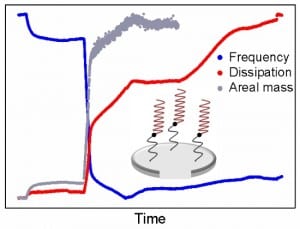 On October 23rd, one of our pre-IGERT fellows, Lindsay Lozeau, attended the Symposium on Cellular Complexity at the University of Massachusetts, Amherst. The symposium was sponsored and attended by Waters and Millipore Corporations, and presenters included Nancy Allbritton from the University of North Carolina, Wolfgang Baumeister from the Max Planck Institute of Biochemistry, Pamela Silver from Harvard Medical School (above), Wendell Lim from UCSF and Renee Deehan Kenney from Selventa Inc. Presentations ranged from cell microtechnologies and programming cell signaling, to applications in personalized treatments, the design of cellular systems and electron-cryomicroscopy. Posters by students across the northeast were also presented during the course of the day.
On October 23rd, one of our pre-IGERT fellows, Lindsay Lozeau, attended the Symposium on Cellular Complexity at the University of Massachusetts, Amherst. The symposium was sponsored and attended by Waters and Millipore Corporations, and presenters included Nancy Allbritton from the University of North Carolina, Wolfgang Baumeister from the Max Planck Institute of Biochemistry, Pamela Silver from Harvard Medical School (above), Wendell Lim from UCSF and Renee Deehan Kenney from Selventa Inc. Presentations ranged from cell microtechnologies and programming cell signaling, to applications in personalized treatments, the design of cellular systems and electron-cryomicroscopy. Posters by students across the northeast were also presented during the course of the day.
Author: FORW-RD NRT
Professor Terri Camesano has a paper accepted for publication by ACS Applied Materials & Interfaces.
Creating Antibacterial Surfaces with the Peptide Chrysophsin-1
Abstract
Immobilization of antimicrobial peptides (AMPs) holds potential for creating surfaces with bactericidal properties. In order to successfully incorporate AMPs into desired materials, increased fundamental understanding of the relationship between AMP immobilization and the efficacy of bound peptides as antibacterial agents is required. In this study, we characterize the relationship between surface binding of the AMP and subsequent ability of the peptide to kill bacteria. Surface immobilization of the AMP chrysophsin-1 (CHY1) via a flexible linker is studied in real-time, using a quartz crystal microbalance with dissipation monitoring (QCM-D). Depending on whether the AMP is physically adsorbed to the surface or attached covalently via a zero-length or flexible cross-linker, changes could be observed in AMP orientation, surface density, flexibility, and activity against bacteria. Covalent surface binding of CHY1 led to the formation of solvated monolayers of vertically positioned peptide molecules, while the physical adsorption of CHY1 led to the deposition of rigid monolayers of horizontally positioned peptide molecules on the sensor surface. Covalently bound peptides were not removed by extensive washing and did not leach from the surface. Zero-length immobilization of the peptide decreased its ability to kill E. coli to 34% ± 7% of added bacteria, while binding via a flexible linker resulted in 82% ± 11% of bacteria being killed by the AMP.
Prof. Billiar and Prof. Camesano presented a seminar on the IGERT program and WPI’s graduate research in Biofabrication at Cornell University on October 2, 2012, in the Biomedical Engineering Department. They also hosted an alumni dinner for WPI BS graduates, who are now pursuing PhD programs at Cornell. Alumni in attendance were Shawn Carey (BME), Jen Richards (BME), Mary Clare McCorry (BME), Funmi Abedayo (BME), Anne Rocheleau (CHE/BME), Eugene Choi (CHE), and Linxiao Chen (CHE). We look forward to continued WPI-Cornell collaborations.
Glenn Gaudette, Associate Professor of Biomedical Engineering, completed Experiential Classroom XIII , a workshop with the theme of “Reaching and Teaching Tomorrow’s Entrepreneurs.” Professor Gaudette, along with 74 other delegates from 7 different countries, participated in activities aimed at improving teaching in creativity, innovation and providing students with an entrepreneurial mindset. The workshop was held over four days at Oklahoma State University, hosted by the School of Entrepreneurship. As part of the training, Prof. Gaudette used a case study to teach OSU students about identifying opportunity in new ventures. He also competed in a Venture Strategy simulation game, taking second place with his Experiential Classroom partner, Cedric Pearce Ph.D. Prof Gaudette plans to incorporate much of what he learned at workshop in his future courses, including a new course he is developing for WPI’s recently awarded IGERT.
IGERT student Todd Alexander
Posted in Research
Todd Alexander, one of the first IGERT fellows gets write up published in his hometown newspaper.

